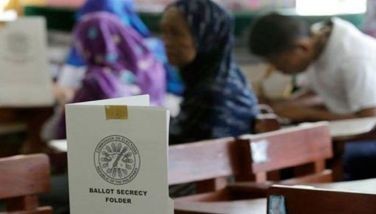DepEd mulling ‘bridge program’ for public school teachers
June 15, 2004 | 12:00am
Teachers of public school students who failed the High School Readiness Test (HSRT) may undergo their own "bridge" program to improve their teaching skills, the Department of Education (DepEd) said yesterday.
"The (HSRT is) not only meant to evaluate the students but the teachers as well," Education Undersecretary Ramon Bacani said. "They may be teaching but they do not know what they teach."
Bacani explained that they are looking into considering the performance of public school teachers when they analyze the results of the HSRT, which tests the students’ mastery of English, science and math.
Nearly half of the 1.4 million to 1.5 million students who took the exam last May 24 failed to hurdle the cut-off score of 30 percent, which required them to correctly answer 27 questions in the 90-item test.
Bacani said that they will take note of teachers with the most number of students who failed the HSRT. These teachers may be asked to undergo a new type of training program based on education officials’ analysis of the HSRT results.
Teachers at both public and private schools usually undergo training workshops during the summer and are supposed to be subjected to a periodic performance evaluation during the school year.
The DepEd program would have required 700,000 incoming freshmen to go through a year of pre-high school remedial or "bridge" classes after the HSRT showed they had not yet mastered the basics of English, science and math.
However, education officials later bowed to strong public pressure by making the bridge program optional. The bridge program has the support of Malacañang and the National Economic and Development Authority, acting as an oversight body for socioeconomic policy.
As a result of the virtual suspension of the bridge program, Education Secretary Edilberto de Jesus said that for the first quarter of the school year in public high schools, all freshman classes will be a review of HSRT.
Depending on the students’ scores in the diagnostic exam to be given at the end of the first quarter, parents will again be given the option to place their poorly performing children in the bridge class.
De Jesus said he was "fairly certain" the scores in the second test will not be dramatically different from the HSRT scores.
Only .52 percent of the incoming freshmen who took the HSRT garnered a score of at least 75 percent. De Jesus said that based on this result, 95.5 percent of incoming freshmen should go through the remedial program.
"The (HSRT is) not only meant to evaluate the students but the teachers as well," Education Undersecretary Ramon Bacani said. "They may be teaching but they do not know what they teach."
Bacani explained that they are looking into considering the performance of public school teachers when they analyze the results of the HSRT, which tests the students’ mastery of English, science and math.
Nearly half of the 1.4 million to 1.5 million students who took the exam last May 24 failed to hurdle the cut-off score of 30 percent, which required them to correctly answer 27 questions in the 90-item test.
Bacani said that they will take note of teachers with the most number of students who failed the HSRT. These teachers may be asked to undergo a new type of training program based on education officials’ analysis of the HSRT results.
Teachers at both public and private schools usually undergo training workshops during the summer and are supposed to be subjected to a periodic performance evaluation during the school year.
The DepEd program would have required 700,000 incoming freshmen to go through a year of pre-high school remedial or "bridge" classes after the HSRT showed they had not yet mastered the basics of English, science and math.
However, education officials later bowed to strong public pressure by making the bridge program optional. The bridge program has the support of Malacañang and the National Economic and Development Authority, acting as an oversight body for socioeconomic policy.
As a result of the virtual suspension of the bridge program, Education Secretary Edilberto de Jesus said that for the first quarter of the school year in public high schools, all freshman classes will be a review of HSRT.
Depending on the students’ scores in the diagnostic exam to be given at the end of the first quarter, parents will again be given the option to place their poorly performing children in the bridge class.
De Jesus said he was "fairly certain" the scores in the second test will not be dramatically different from the HSRT scores.
Only .52 percent of the incoming freshmen who took the HSRT garnered a score of at least 75 percent. De Jesus said that based on this result, 95.5 percent of incoming freshmen should go through the remedial program.
BrandSpace Articles
<
>
- Latest
- Trending
Trending
Latest
Trending
Latest
Recommended
































